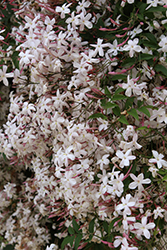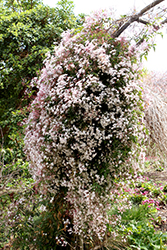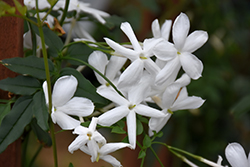Height: 12 feet
Spread: 5 feet
Sunlight:
![]()
![]()
Hardiness Zone: 7b
Other Names: Many-flowered Jasmine
Description:
Climbing habit perfect for walls, trellises and pergolas; a low maintenance shrub; proper fertilizing and pruning will maximize blooming; incredible display of small, star-shaped flowers with heavenly aroma
Ornamental Features
Climbing Jasmine is covered in stunning fragrant white star-shaped flowers held atop the branches from late winter to early spring, which emerge from distinctive burgundy flower buds. The flowers are excellent for cutting. It has dark green evergreen foliage. The small oval pinnately compound leaves remain dark green throughout the winter.
Landscape Attributes
Climbing Jasmine is a dense multi-stemmed evergreen woody vine with a twining and trailing habit of growth. Its average texture blends into the landscape, but can be balanced by one or two finer or coarser trees or shrubs for an effective composition.
This is a relatively low maintenance woody vine, and should only be pruned after flowering to avoid removing any of the current season's flowers. It is a good choice for attracting hummingbirds to your yard. It has no significant negative characteristics.
Climbing Jasmine is recommended for the following landscape applications;
- Mass Planting
- Hedges/Screening
- General Garden Use
- Container Planting
Planting & Growing
Climbing Jasmine will grow to be about 12 feet tall at maturity, with a spread of 5 feet. As a climbing vine, it tends to be leggy near the base and should be underplanted with low-growing facer plants. It should be planted near a fence, trellis or other landscape structure where it can be trained to grow upwards on it, or allowed to trail off a retaining wall or slope. It grows at a medium rate, and under ideal conditions can be expected to live for approximately 30 years.
This woody vine does best in full sun to partial shade. It does best in average to evenly moist conditions, but will not tolerate standing water. It is not particular as to soil type or pH. It is somewhat tolerant of urban pollution, and will benefit from being planted in a relatively sheltered location. Consider applying a thick mulch around the root zone over the growing season to conserve soil moisture. This species is not originally from North America.
Climbing Jasmine makes a fine choice for the outdoor landscape, but it is also well-suited for use in outdoor pots and containers. Because of its spreading habit of growth, it is ideally suited for use as a 'spiller' in the 'spiller-thriller-filler' container combination; plant it near the edges where it can spill gracefully over the pot. It is even sizeable enough that it can be grown alone in a suitable container. Note that when grown in a container, it may not perform exactly as indicated on the tag - this is to be expected. Also note that when growing plants in outdoor containers and baskets, they may require more frequent waterings than they would in the yard or garden.
Disclaimer - This resource is provided for informational purposes only and does NOT reflect current availability. Inventory varies seasonally, so we cannot guarantee that every plant will be in stock at all times - please contact your favourite GardenWorks location directly for current availability. It does not include our entire inventory of plants, so be sure to visit GardenWorks to see varieties that may not be represented on this list.



